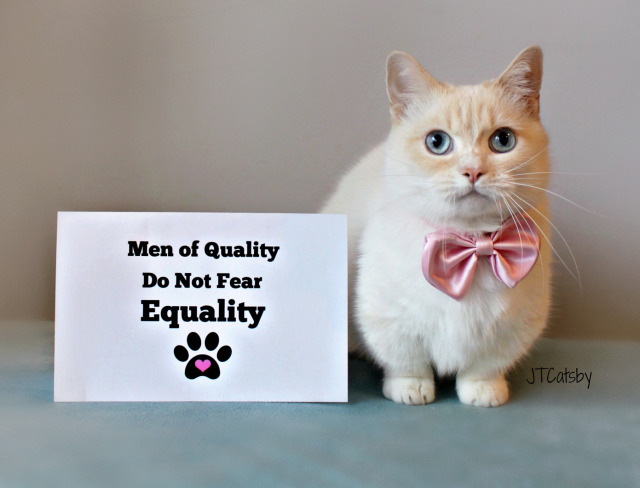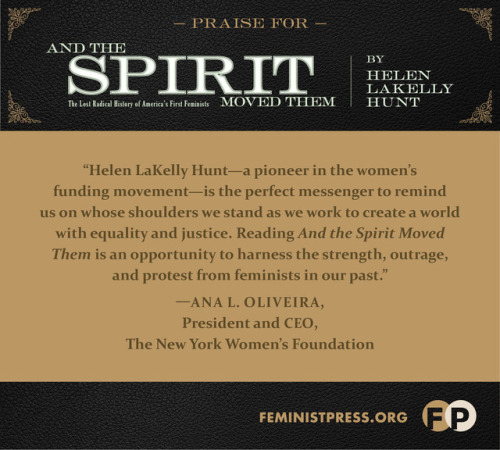#womens equality

A decade before the historic Seneca Falls Convention in 1848, another notable meeting took place. In 1837, black and white women joined forces to challenge both slavery and patriarchy at the 1837 Anti-Slavery Convention. This little known gathering was written out of history – until now.
“And the Spirit Moved them” by Helen LaKelly Hunt details the lost radical history of America’s first feminists. Learn more via Feminist Press.
Post link
The latest in Campari America’s Spirited Connections interview series with blogger Gastronomista. This edition looks at championing Women’s Equality in the spirits industry. http://www.gastronomista.com/2017/04/alex-jump-speed-rack.html#.WQN9uRPyt1t
Post link

The new Cato 2018 Paid Leave Survey of 1,700 adults finds that nearly three-fourths (74%) of Americans support a new federal government program to provide 12 weeks of paid leave to new parents or to people to deal with their own or a family member’s serious medical condition. A quarter (25%) oppose establishing a federal paid leave program. Support slips and consensus fractures for a federal paid leave program, however, after costs are considered.
The survey found 54% of Americans would be willing to pay $200 a year in higher taxes, a low-end estimate for a 12-week federal paid leave program. However, majorities of Americans would oppose establishing a federal paid leave program if it cost them $450 a year in higher taxes (52% opposed) or $1,200 a year in higher taxes (56% opposed), the mid-range and high-range cost estimates respectively.
These low-, mid-, and high-range cost estimates are based on the most high-profile federal paid leave program proposed to date: The Family and Medical Insurance Leave Act (FAMILY Act).
The survey also did not ask questions about what paid leave policies Americans would like to see offered at private companies. Instead, the Cato 2018 Paid Leave Survey focuses on what people think about establishing a government-provided paid family leave program at the federal level.

Paid parental leave provides workers with financial compensation during temporary absences following the birth or adoption of a child. Private companies often provide paid leave and the federal government mandates 12 weeks of job-protected unpaid leave, but recently policymakers and advocates have become dissatisfied with the status quo.
Proponents of federal intervention argue that the private market does not or cannot provide sufficient paid leave. Moreover, proponents believe government supported leave would improve labor market outcomes and reduce gender and labor-market inequality.
However, the evidence that suggests otherwise…
First, ample data show that the private market provides paid leave at rates about 30 to 50 percentage points higher than proponents claim. Private paid leave provision has grown three- or fourfold over 50 years and continues to grow. This trend indicates industry is responsive to employee demands.
Second,workers may not be better off under federal paid leave and may be worse off. Government intervention provides new incentives, and individuals are likely to adapt accordingly. Evidence suggests government supported leave may result in wage or benefit reductions, female unemployment, or reduced professional opportunities for women.
Government intervention is also unlikely to correct gender or labor-market inequality in ways proponents desire. For example, families may respond to the policy by increasing women’s household work contributions relative to men’s. Redistributive effects of government intervention are likely to harm workers.
Policymakers should not adopt paid parental leave policies. Instead, they should consider improving workers’ lives through reforms that increase economic efficiency, remove barriers to flexible work, and increase choice.

Happy #WomensEqualityDay !!! Tag the strong women in your life (and the men who stand beside them) to show them your love! #nationalwomensequalityday #womensequality #equality #equalityforall #girlsjustwannahavefundamentalrights #equalitycantwait #JTCatsby
•
•
•
#mcm #mondaymood #mondaymotivation #munchkincrushmonday #catsofinstagram #potd #weeklyfluff #munchkin #munchkincat #munchkinlovers #buzzfeedanimals #thedodo #ragdollcat #adoptdontshop #rescuepet #dapper #bowtie #bowtiesarecool #supportwomen #womenempowerment #girlpower







